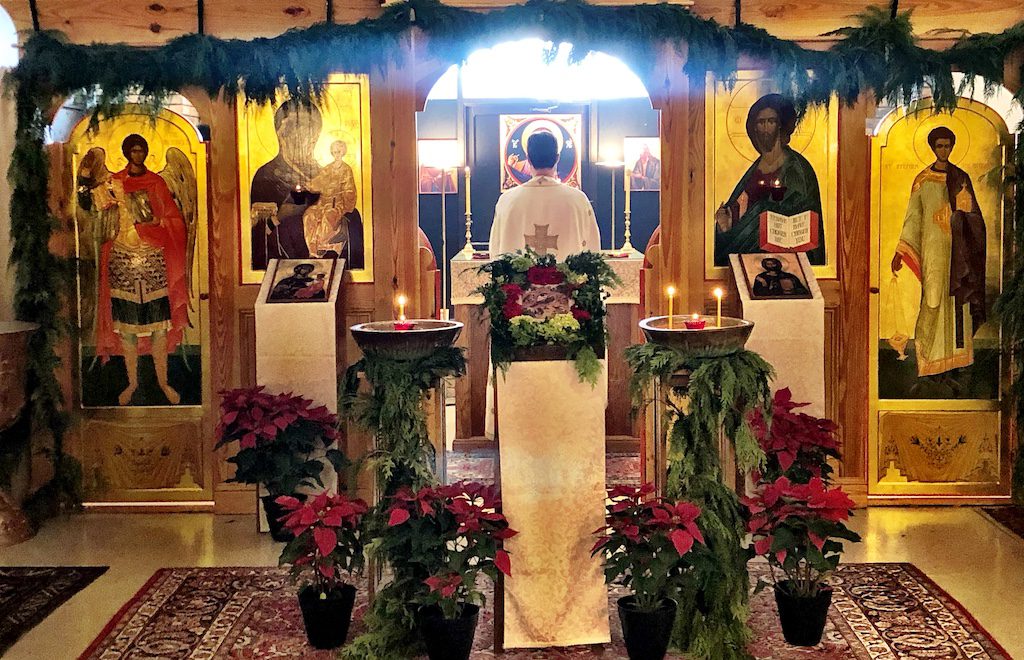The Bizarre Mystery Of Christmas

Our priest included in his Christmas homily a quote from the Nativity sermon of St. Gregory Palamas. I was unfamiliar with this homily until our pastor mentioned it. It’s really something. It’s about the birth of Jesus as the antidote to Satanic pride, which brought about the Fall. It’s about the deceit of power. Excerpt:
Now since it was God’s good pleasure to annul the pretext for that pride which brought down His rational creatures, He makes everything like Himself; and because by nature He is equal to Himself and equal in honour, He makes the creation equal to itself by grace and equal in honour. And how was this done? The very Word of God from God emptied Himself in an indescribable way, came down from on high to the lowest state of man’s nature, and indissolubly linked it with Himself, and in humbling Himself and becoming poor like us, He raised on high the things below, or rather, He gathered both things into one, mingling humanity with divinity, and by so doing He taught everyone that humility is the road which leads upwards, setting forth today Himself as an example before men and holy angels alike.
Because of this, the angels now possess steadfastness, having learnt in a practical way from the Master that the way to be exalted and to resemble Him is not arrogance but humility. Because of this, men are easily set right, as they recognize humility as the road by which they are recalled. Because of this, the prince of evil, who is conceit itself, has been put to shame and overthrown, whereas previously he imagined that he could somehow stand and was something, inasmuch as he had enslaved some, and pulled them down with himself, through their desire for something greater, while also hoping to do the same to others through their extreme folly. Now he is seen as a plaything, having been well and truly found out by those he had evilly deceived before. Now that Christ had been born, the devil is trampled down by those who were previously under his feet, who are no longer presumptuous, as the destroyer advised, but identify with the lowly (Romans 12.16), as the Saviour taught through His deeds, and win heavenly exaltation through humility.
That is why God who sits upon the cherubim (Psalm 99.1) is set before us as a babe on earth. He upon whom the six-winged seraphim cannot look, being unable to gaze intently not only at His nature but even at the radiance of His glory, and therefore covering their eyes with their wings (Isaiah 6.2), having become flesh, appears to our senses and can be seen by bodily eyes. He who defines all things and is limited by none is contained in a small, makeshift manger. He who holds the universe and grasps it in the hollow of His hand, is wrapped in narrow swaddling bands and fastened into ordinary clothes. He who possesses the riches of inexhaustible treasures submits Himself voluntarily to such great poverty that He does not even have a place at the inn; and so He enters into a cave at the time of His birth, who was brought forth by God timelessly and impassibly and without beginning. And–how great a wonder!–not only does He who shares the nature of the Father on high put on our fallen nature through His birth, nor is He subject merely to the utter poverty of being born in a wretched cave, but right from the very start, while still in the womb, He accepts the final condemnation of our nature. He who is by nature Lord of all is now ranked with the servants and enrolled with them (Luke 2.1-6), clearly making humble service to others no less honourable than the exercise of lordship, or rather, showing the servants as having greater honour than the earthly ruler at that time, provided of course they understood and obeyed the magnificence of grace. For the man who then seemed to rule the world was not counted with the King of heaven, though all his subjects were, nor was this earthly ruler reckoned then as one of them, but the heavenly Lord was.
Read the entire homily by the saint, a 14th century Orthodox theologian and archbishop.
Consider the radical nature of what happened in Bethlehem! St. Gregory compels us to attend closely to what by now has become commonplace in our imagination. The great mystery and miracle was right in front of me, but St. Gregory helped me to see its meaning in a way I had not thought about in a long time. Kierkegaard called this the “Absolute Paradox”: the scandalous idea that the Creator of the Cosmos would incarnate as a man, and not just a man, but a poor man in the desert. Christianity is so marvelously weird! I feel somehow that I will be spending the next year learning how to re-weird it for people. Think, Christians, about what we believe, and what it means!
Here is the troparion, or short hymn, that we Orthodox sing on Christmas:
Thy Nativity, O Christ our God,
Has shone to the world the light of knowledge;
For by it those who worshipped the stars
Were taught by a star
To worship Thee, the Sun of Righteousness,
And to know Thee, the Dayspring From On High,
O Lord, glory to Thee!
This teaches us that the natural world is not to be worshiped, but that all creation is a sign pointing to the Creator, who is everywhere present, and fills all things.
Merry Christmas, friends!